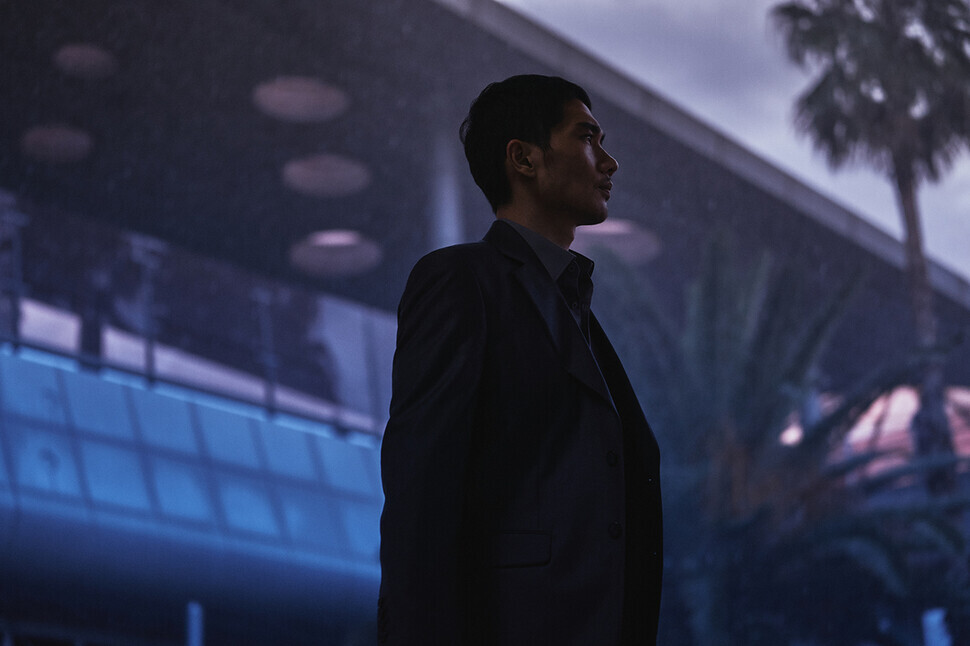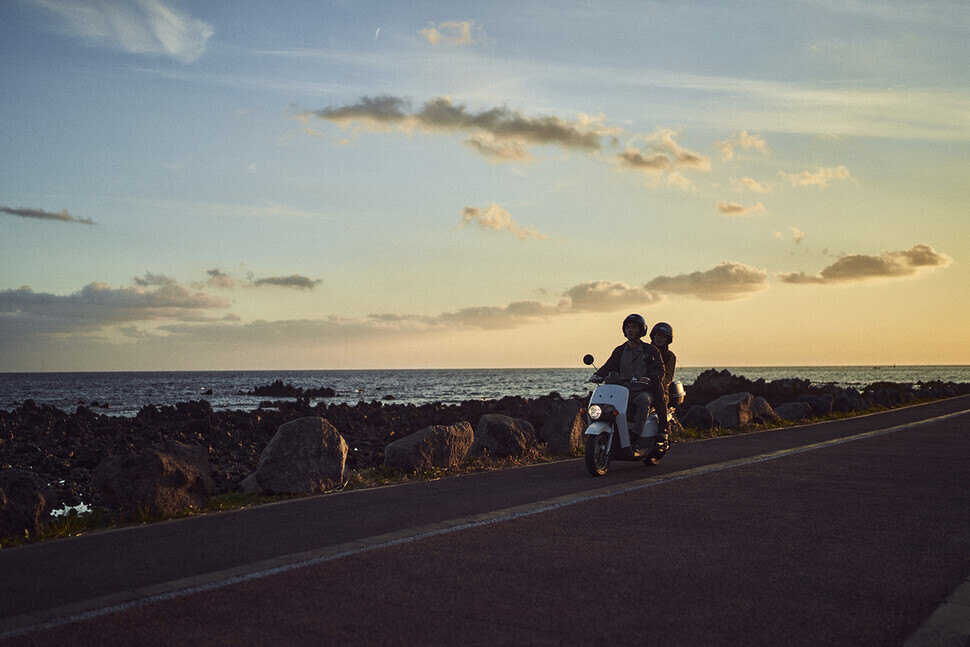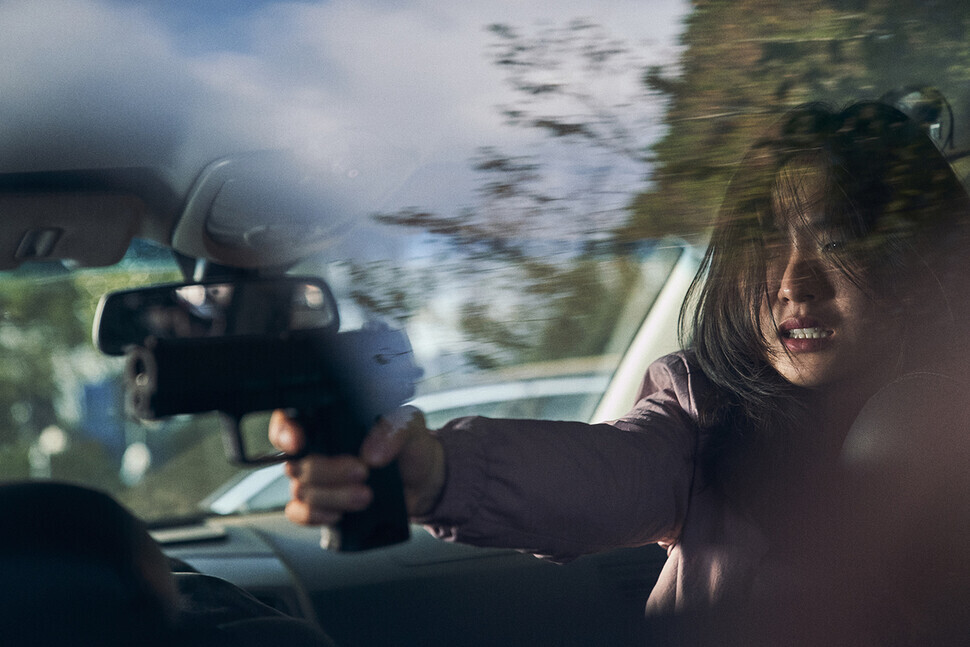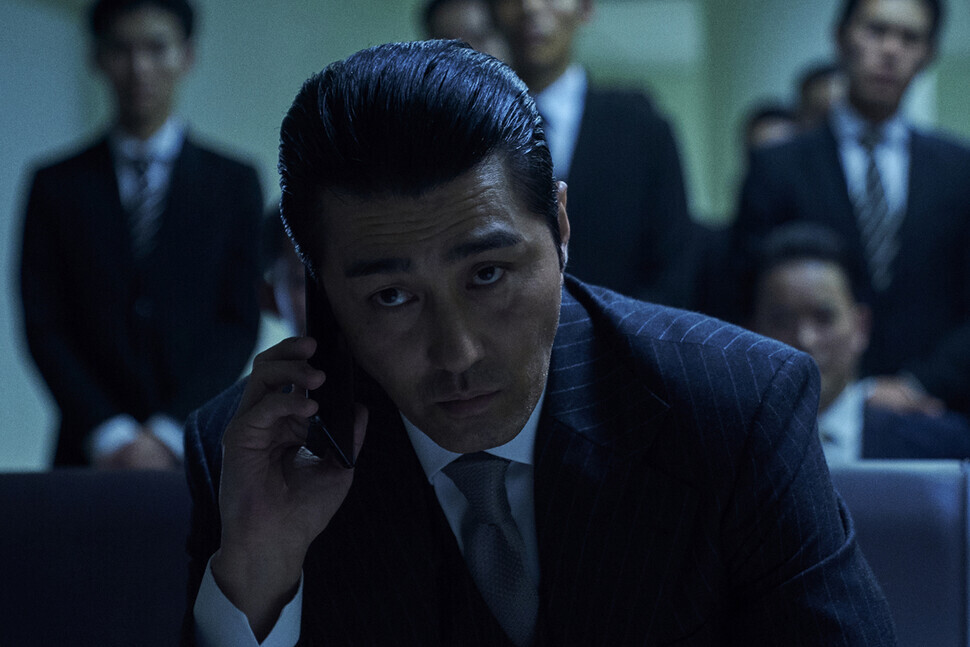hankyoreh
Links to other country sites 다른 나라 사이트 링크
[Film review] “Night in Paradise” explores human connection in backdrop of gang violence

Jeju Island is like a paradise, peaceful and beautiful. When night falls on that paradise, it arrives in a deep shade of blue.
Choi Sung-won of the group Deulgukhwa may have sung a romantic song about the “Blue Night on Jeju Island,” but for some people, the nights on this idyllic island are something sad and painful.
“Night in Paradise,” the new film by director Park Hoon-jung, is a beautiful yet sad noir work scheduled to arrive on Netflix Friday.
Tae-gu (played by Uhm Tae-goo) is a hotshot member of a criminal gang whose sister and nephew are killed in a suspicious car accident. Sensing that the rival Buksung gang is behind the deaths, he risks everything to avenge them.
As he prepares to travel to Vladivostok in secret to complete his mission, he hides out briefly on Jeju Island, where Jae-yeon (Jeon Yeo-been) lives together with her illegal weapons dealer uncle.
Jae-yeon is tasked with picking Tae-gu up from the airport instead of her uncle. The organization has asked the uncle to conceal him. The first meeting between Tae-gu and Jae-yeon takes place in awkward silence.

“New World” (2013) is considered Park Hoon-jung’s most prominent work to date. That movie was about the human connection that forms between an undercover police officer infiltrating a criminal syndicate (Lee Jung-jae) and one of its mid-level bosses (Hwang Jung-min), as well as the dynamics that operate within the organization.
It drew more than four million viewers to theaters and was regarded as a modern classic of Korean noir.
“Night in Paradise” is similar in the sense of the rapport between two main characters forming an undercurrent that runs throughout the film.
But while “New World” focused on the unpredictable developments in its storyline, “Night in Paradise” puts more emphasis on human emotions and the lyricism of its backdrop. The story structure functions as more or less a minimal element to generate that sense of atmosphere.
Tae-gu and Jae-yeon have something in common: both of them have been driven to the edge after losing beloved family members. When an incident suddenly befalls Jae-yeon’s uncle, the two of them go on the run.
In images that call to mind a romantic road movie, the two of them drive their car along Jeju’s mountain roads, surrounded by lush forests of trees with their branches outstretched, or ride together on a motorcycle along the beach with the sunset in the distance.
As enjoying a meal of raw seafood soup — a seaside favorite — they dip their feet in the water and enjoy a cigarette in a moment that evokes the calm before the storm. It’s even more beautiful and heartbreaking because it is all about to disappear.

In the second half of the film, the mood takes a sharp turn as Chief Ma (Cha Seung-won), the number-two figure in the Buksung gang, arrives on Jeju. The momentary peace vanishes and the ensuing scenes are filled with tense pursuits and intense brawling. The lyrical music takes on a faster rhythm, and the deep blue shades that had dominated the film are overlaid with the deepening red hues of bloodshed.
When the final battle arrives, it is dry and chilly rather than heated — an action sequence that evokes a sense of bleakness instead of exhilaration.
Chief Ma is a powerful presence, someone who handles difficult business coolly and without hesitation even when he resents having to do it. It’s a quiet film, but his dialogue infuses it with a certain energy — appropriately harsh and weighty, but with an unexpected element of humor.
Chief Ma appears likely to go down as one of actor Cha Seung-won’s defining roles. When the film was invited last September for an out-of-competition screening at the Venice International Film Festival, the foreign press lauded the character as the “most striking.”
Explaining the reason for the invitation, the festival’s artistic director Alberto Barbera said that “Night in Paradise” was “one of the most outstanding gangster films to appear in Korean film during the past few years.”
He also predicted that the name of director Park Hoon-jung would become “much more widely recognized in the future.”

A theatrical release had been planned for the film, but the decision was finally made to release it on Netflix as the COVID-19 pandemic persisted.
“It’s a different kind of tension and excitement [from a domestic premiere] to think that so many people in so many different countries will be seeing it all at once,” said Park ahead of the film’s release in over 190 countries.
“I’m also curious to see how foreign viewers respond to a film that was tailored to the sentiments of Korean viewers,” he added.
By Suh Jung-min, staff writer
Please direct comments or questions to [english@hani.co.kr]

Editorial・opinion
![[Column] Season 2 of special prosecutor probe may be coming to Korea soon [Column] Season 2 of special prosecutor probe may be coming to Korea soon](https://flexible.img.hani.co.kr/flexible/normal/500/300/imgdb/original/2024/0426/3317141030699447.jpg) [Column] Season 2 of special prosecutor probe may be coming to Korea soon
[Column] Season 2 of special prosecutor probe may be coming to Korea soon![[Column] Park Geun-hye déjà vu in Yoon Suk-yeol [Column] Park Geun-hye déjà vu in Yoon Suk-yeol](https://flexible.img.hani.co.kr/flexible/normal/500/300/imgdb/original/2024/0424/651713945113788.jpg) [Column] Park Geun-hye déjà vu in Yoon Suk-yeol
[Column] Park Geun-hye déjà vu in Yoon Suk-yeol- [Editorial] New weight of N. Korea’s nuclear threats makes dialogue all the more urgent
- [Guest essay] The real reason Korea’s new right wants to dub Rhee a founding father
- [Column] ‘Choson’: Is it time we start referring to N. Korea in its own terms?
- [Editorial] Japan’s rewriting of history with Korea has gone too far
- [Column] The president’s questionable capacity for dialogue
- [Column] Are chaebol firms just pizza pies for families to divvy up as they please?
- [Column] Has Korea, too, crossed the Rubicon on China?
- [Correspondent’s column] In Japan’s alliance with US, echoes of its past alliances with UK
Most viewed articles
- 11 in 5 unwed Korean women want child-free life, study shows
- 2AI is catching up with humans at a ‘shocking’ rate
- 3[Column] Has Korea, too, crossed the Rubicon on China?
- 4[Column] Season 2 of special prosecutor probe may be coming to Korea soon
- 5Division commander ordered troops to enter raging flood waters before Marine died, survivor says
- 6[Photo] More Sewol paintings by Hong Sung-dam
- 7Court dismisses comfort women’s suit against government for signing 2015 agreement with Japan
- 8[Editorial] Seoul’s callous response to disability rights protests
- 9Netflix imperialism: Are Korea’s days as the platform’s favorite content creator numbered?
- 10Marriages nosedived 40% over last 10 years in Korea, a factor in low birth rate